New Zealand’s Chris Hipkins and Christopher Luxon toughen up on China, defence
NZ is about to embrace a new era in national security with a tougher approach to China and a promise of much greater defence spending when the country goes to the polls.
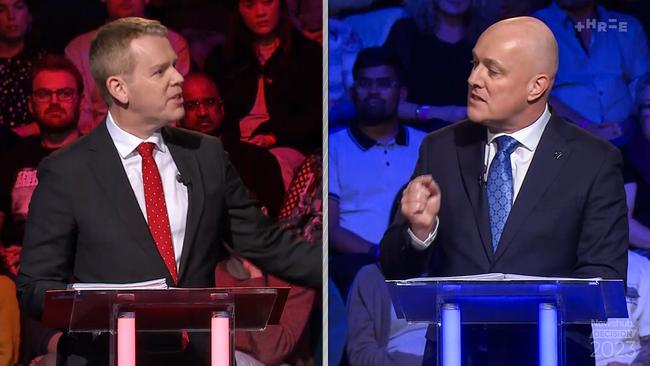
New Zealand is about to embrace a historic new era in national security with a tougher approach to China and a promise of much greater defence spending when the country goes to the polls next Saturday, October 14.
The more hawkish approach will mark the most consequential departure in New Zealand’s foreign and defence policy since its contentious 1984 decision to ban nuclear-powered or nuclear-armed ships from its waters.
For Australia, the election even carries the potential to co-operate with New Zealand on futuristic defence technology as part of pillar two of the AUKUS security pact, a move that would have seemed unthinkable just a year ago under prime minister Jacinda Ardern.
Both Labour Prime Minister Chris Hipkins and his challenger, the National Party’s Christopher Luxon, have foreshadowed a more robust approach to China, defence and the country’s national security if elected.
Such a move will be welcomed by Australia and key allies such as the US, which have been frustrated for decades by New Zealand’s refusal to spend adequate amounts on defence and, in recent years, by its reluctance to challenge China’s behaviour in the region.
When it comes to China, the policies of both major parties mark a fresh stage in the slow, belated awakening of New Zealanders to the strategic challenge Beijing poses to the region, including to its South Pacific neighbours.
For the first time in years, the concern about the region’s deteriorating security situation has led both major parties to promise substantial increases in defence spending, albeit off a historically low base.
Luxon, whose National Party is tipped to win government in coalition with the right-wing libertarian ACT party, has promised eventually to double the country’s defence spending from 1 per cent of gross domestic product to 2 per cent – similar to Australia – although he has given no timeframe for this.
Even as both parties embrace tougher policies, New Zealanders are still more wary than Australia has been of angering Beijing and undermining their heavy trade dependence on China. Foreign and defence policy will not affect the election result, with voters more concerned about cost-of-living issues, and Hipkins and Luxon both have focused on other issues on the campaign trail.
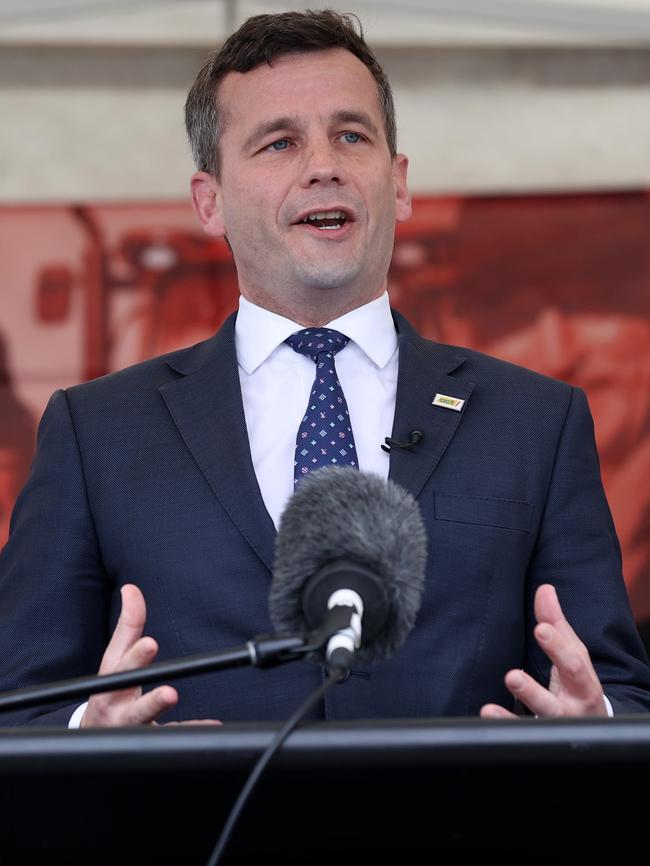
Luxon left it until weeks before the election even to begin to clarify where he stands on the issue of China or on defence spending.
But at two leaders’ debates with his rival, Luxon made it clear National and Labour had a bipartisan approach to China, suggesting New Zealand’s gradually tougher rhetoric on Beijing would not soften under a National government.
Yet Luxon, a businessman turned politician who has put the economy at the centre of his election push, also has said he would support direct Chinese investment to help fund his $NZ26bn road infrastructure policy as part of the Chinese Communist Party’s Belt and Road Initiative.
His comments drew immediate criticism from some commentators including David Seymour, leader of the ACT party.
“We need to welcome foreign investment but not at the cost of being bullied or cowed by a bigger nation looking to gain leverage,” Seymour says. He tells The Weekend Australian that New Zealand had made a “major strategic mistake” in becoming dependent on China for the bulk of its trade.
The ruling Labour government of Hipkins has further toughened its rhetoric towards China since the departure of Ardern in February and has promised to spend more on defence.
The rise of China, and especially its push to influence Pacific Islands nations, has created growing tension for New Zealand’s traditional foreign and defence policy. The country’s self-proclaimed independent foreign policy path, forged after the ban on nuclear-armed warships in the 1980s, seeks to be a good global citizen promoting free trade, rule of law and human rights with minimal focus on defence and security. But New Zealand’s refusal to spend more than 1 per cent of its GDP on defence has resulted in the country drifting so far away from the 1951 Australia-New Zealand-US security alliance that Australia now refers to New Zealand as a partner rather than an ally.
This small-target approach has looked increasingly out of place amid rising geopolitical tensions created by China’s record defence spending, its illegal takeover of island features in the South China Sea, its push for military footholds in the South Pacific and its promotion of cyber espionage and foreign interference.
As with Australia, China is easily New Zealand’s biggest export market, buying 29 per cent of New Zealand exports, which are dominated by dairy, meat and wood.
New Zealand has watched warily from a distance as China hit Australia with $20bn in trade sanctions after Canberra toughened its stance against Beijing through foreign interference laws, the banning of telco giant Huawei from the 5G rollout and calling for an inquiry into the origins of the coronavirus. Fear of being hit by similar trade reprisals has played a part in New Zealand adopting a slower, more passive response to China’s poor regional behaviour than we saw in Canberra and Washington.
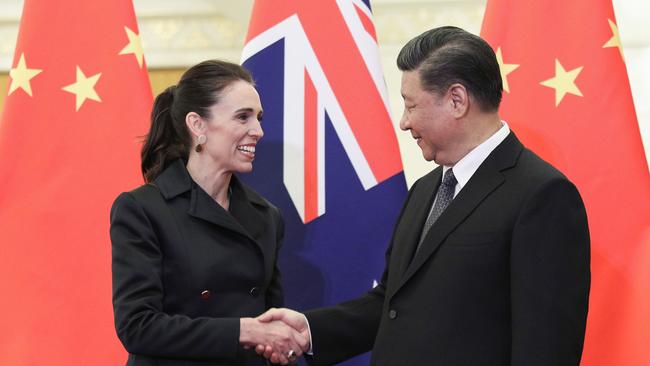
It was not until 2018 that New Zealand marginally moved to toughen its approach to China, with Ardern’s “Pacific reset” aimed at expanding New Zealand’s diplomatic footprint in the Pacific to help counterbalance Beijing’s influence peddling. The government also turned down Huawei’s participation in the country’s 5G rollout.
Since then the Labour Party has spoken more bluntly about the deteriorating security outlook but still with a softer line than Australia – a fact that frequently has frustrated Canberra.
In early 2021 New Zealand’s Trade Minister Damien O’Connor even suggested Australia should speak with more respect and diplomacy towards China, although he quickly retreated from the claim.
That same year, New Zealand was the only member of the Five Eyes intelligence-sharing arrangement not to be included in a joint statement criticising the arrests of pro-democracy figures in Hong Kong.
But in August this year the Labour government, by then led by Hipkins, released three major national security documents: an inaugural national security strategy, a defence policy and strategy, and a paper on future force design principles. Taken together, these contained New Zealand’s strongest rhetoric yet on China, claiming Beijing “has become more assertive and more willing to challenge international rules and norms”.
“China’s growing economic, political and military power and more assertive pursuit of its interests abroad is a key driver of the growing strategic competition in the region,” the national security strategy says.
It says China’s signing of a security pact with Solomon Islands was a sign of Beijing’s intent to “expand its influence with Pacific Island countries”, warning if China succeeded in creating a military base it would “fundamentally alter the strategic balance in the region”.
“This year has been quite striking in that as the security situation has deteriorated there has been more emphasis by the government on recognising and acknowledging it,” says Jason Young, director of the Contemporary China Research Centre at Victoria University in Wellington.
Defence Minister Andrew Little says the strategic circumstances warrant more spending on defence for a country that traditionally has left it to Australia to pay the extra cost of safeguarding New Zealand’s security. But Little has not said how much more a Labour government would be willing to commit to defence or when that might occur.
ACT party leader Seymour, in comparison, is campaigning on a promise of doubling New Zealand’s defence spending from 1 per cent to 2 per cent of its GDP, and Luxon has said he would like to double the defence budget “eventually”.
New Zealand Navy chief David Proctor has been surprisingly blunt about the need for his country to spend more on defence.
“When you look at what China is doing and their hugely significant additional spend on their military capability, particularly maritime capability, we in New Zealand can’t stand aside and say ‘nothing to see here – we will just carry on with what we’re what we’re doing’,” Proctor said in April.
Yet, in sharp contrast to Australia, China has declined to impose trade sanctions on New Zealand despite the country employing tougher rhetoric against China, banning Huawei and openly accusing China of foreign interference and cyber attacks on the country.
Indeed, during Hipkins’s visit to China in June, President Xi Jinping lavished praise on New Zealand as a “friend and partner” of “great importance”.
“I think Chinese officials made an assessment that it is better to suggest that New Zealand is still on side whilst China is having problematic relations with other Western nations,” Young says. “There’s not really any major difference in the issues, it just hasn’t played out the same way.”
From Australia’s perspective it is important that whoever wins the election continues to pursue policies that counterbalance China’s influence in the South Pacific and that New Zealand plays a bigger role in regional defence.
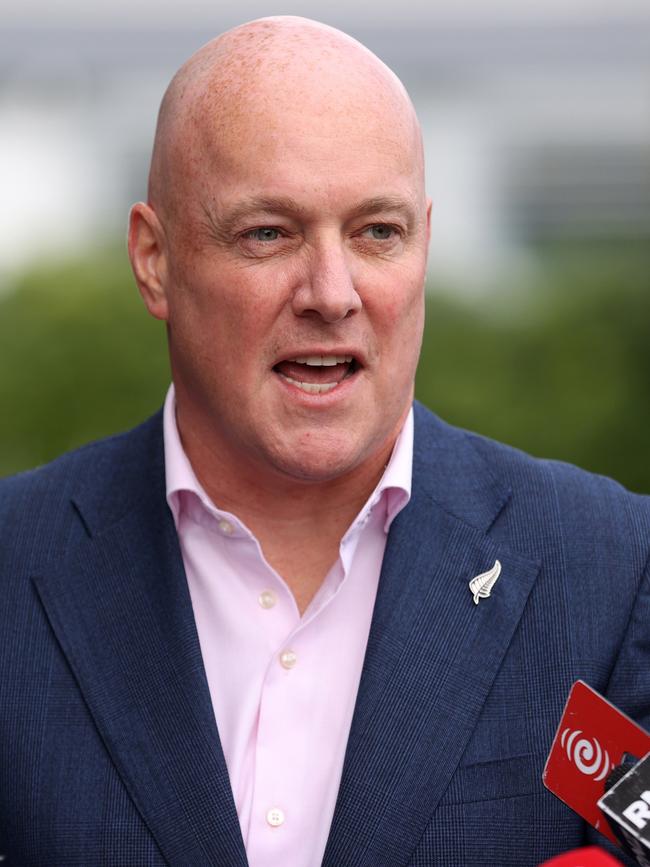
This is the direction in which the Hipkins Labour government is already heading. Luxon’s commitment that policy towards China would not soften under a National Party-led government has helped allay initial fears that a Luxon-led government might prioritise the protection of business and trade with Beijing over speaking plainly about China when required.
Farmers and rural voters who rely most heavily on exports to China are traditionally National Party voters.
Young says that in New Zealand both the far left and the far right of politics favour a softer approach to China, but he believes the centre of the political spectrum understands the need for a sensible middle ground in dealing with Beijing.
“I think in the centre of politics, where the two main parties sit (Labour and National) there is more policy coherence. They want a good relationship with China but they have also learned that it is important that New Zealand stands up for its interests and has a strong eye to some of the risks in the relationship.”
University of Otago professor of international relations Robert Patman says both Australia and New Zealand are on the same page when it comes to China but the rhetoric has been slightly different.
“New Zealand has on the whole shared Australia’s concerns about China but has tended to express them differently,” he says. But New Zealand’s growing concerns about China have not yet led to notably closer defence and security ties with Australia.
The issue of New Zealand’s participation in the three-nation AUKUS security pact has been a hot potato, with neither of the major parties offering a settled position on it. Although New Zealand cannot participate in the nuclear submarine project because of its ’80s-era anti-nuclear policy, both Australia and the US have urged it to be a part of the so-called pillar two of AUKUS, which includes collaboration on hypersonics, electronic warfare, artificial intelligence and undersea capabilities, among others.
Defence Minister Little says Labour would be “willing to explore” co-operating on pillar two of AUKUS, but Foreign Minister Nanaia Mahuta rejected the idea, saying “we’re not contemplating joining AUKUS”, while Hipkins has said the idea is “purely hypothetical” at this stage.
However a New Zealand Defence Department briefing to ministers in March, released under Freedom of Information laws, said the Hipkins government “understands the strategic rationale for AUKUS and we share our partners’ assessment of the deteriorating strategic outlook”.
Luxon recently made it clear his government would keep the door open to AUKUS, stating at a pre-election leaders’ debate he was willing to explore joining the pact and “see how we can participate in it”.
While his statement was relatively vague, it was significant given it was the first time he had spoken about his policy on the AUKUS pact in public.
“This is quite a remarkable turnaround in NZ’s posture,” says University of Otago associate professor Nicholas Khoo, who specialises in Chinese foreign policy, great power politics and Asian security.
“Both parties are saying they are open to considering AUKUS, and are willing to say it openly despite the fact that it may be adverse to NZ’s interests. This is a sea change.”
Luxon’s foreign affairs spokesman, Gerry Brownlee, has expressed concern about the entire AUKUS pact, saying he is concerned AUKUS is painting China as an enemy that needs to be contained. “What I don’t like is the concept that we just seem to be dividing the world,” he says.
But Luxon would be expected to hold to his agreement to explore joining AUKUS by potential coalition partner ACT under Seymour and New Zealand First under the more capricious Winston Peters. Both minor party leaders take a tougher stance on China and both support joining pillar two. (Seymour points out that even if New Zealand’s nuclear-free policy didn’t prohibit joining pillar one, the country could not afford more than one nuclear-powered submarine).
“We’ve got to pull our weight and participate properly in the Anzac defence force,” says Seymour. “At the moment we’re not capable of doing that but we need to do more. We’re reliant on collective security.”
Seymour also stresses that a National-ACT government would be more aligned to the interests of Australia’s Labor government than Hipkins’s Labour Party, particularly over defence of the Indo-Pacific.
Peters says cost could be a barrier to joining AUKUS, but he adds; “On the issue of law and order and democracy you don’t have the choice of picking sides, you’ve got to defend it or not.”
Khoo says New Zealand could have a valuable part to play in pillar two; it is not only an ideal location from which to launch satellites but an entire industry has grown up around such launches – Rocket Lab, for instance, has installed the world’s only private orbital launch range on North Island.
However, Khoo says he would be surprised if New Zealand joined AUKUS, “because of the strength of opinion against it”.
He points out that New Zealand’s “nuclear free” argument against nuclear subs is a misnomer because the vessels are nuclear-powered, not nuclear-armed, but adds: “That may not be the most reasoned argument against AUKUS, but the government can’t ignore strongly held opposition to it. New Zealand seems to have an aversion to great power politics and a trend to pacifism. But in a deteriorating geopolitical environment this pacifism doesn’t reflect international trends.”
Massey University senior lecturer in international security Anna Powles says she is surprised by the enduring strength in New Zealand of anti-nuclear and anti-US sentiment, which is critical of concepts such as AUKUS.
“There is still a very strong anti-nuclear, anti-American sentiment, which is really quite remarkable,” Powles says.
“There is still that strong peace movement, anti-nuclear strain here – very strong with the Green Party but also with the Maori Party, which recently called on NZ to be the Switzerland of the Pacific.”
A recent paper for the Lowy Institute co-authored by Powles and University of Adelaide professor of international security Joanne Wallis says Australia’s recent Defence Strategic Review did not even refer to New Zealand as an ally any more but rather as a “key partner in the Pacific”, describing it as a “relegation of Australia’s relations with New Zealand”.
Helen Clark, the former prime minister who was instrumental in developing New Zealand’s ban on nuclear-armed warships in the ’80s, says: “Participation in AUKUS would risk (New Zealand’s) independent foreign policy and potentially its nuclear-free component too.”
Khoo dismisses Clark’s comment as “opinion, not fact”, saying that clinging to an independent foreign policy is unrealistic in the current geopolitical climate. He points out that New Zealand’s decades-long under-investment in defence means it is taken less seriously by its larger neighbour – and this is the reason it was mentioned only once in the Defence Strategic Review.
Despite this, Australia and New Zealand’s Labour government increasingly have converged in their views about the challenges that China poses to the region.
Seymour says he’s confident this would continue under a new National-led government, adding that on defence a National-ACT government would be more aligned with Australia than the current Labour Party.
That is a shift that will be warmly welcomed by Australia.


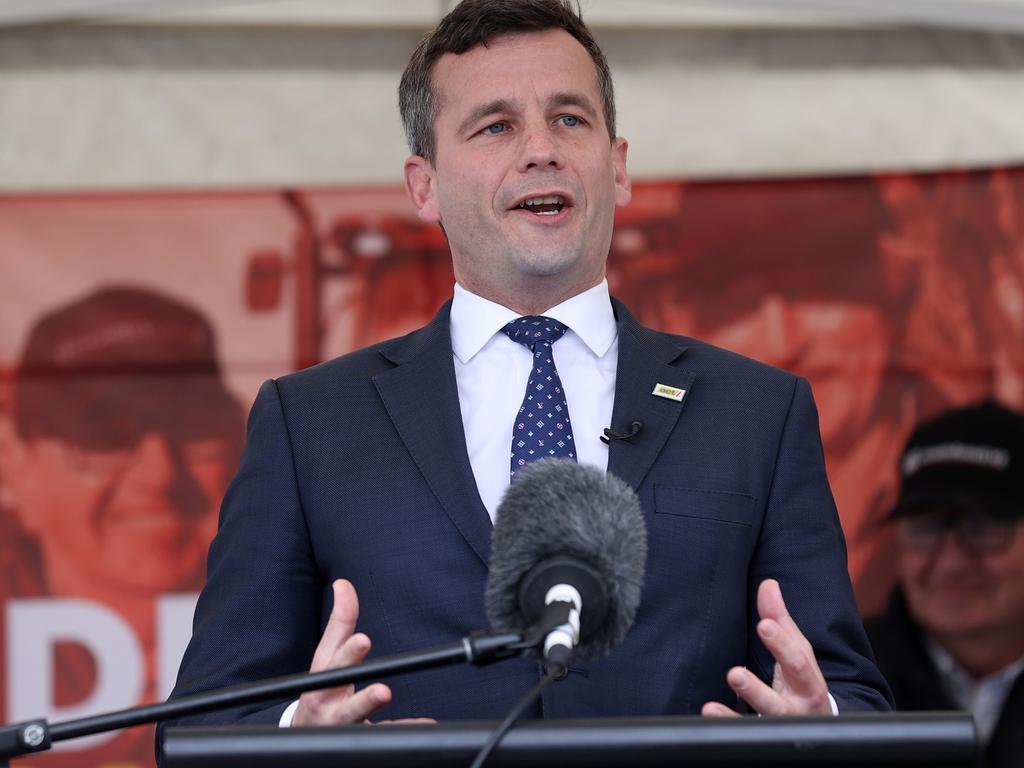
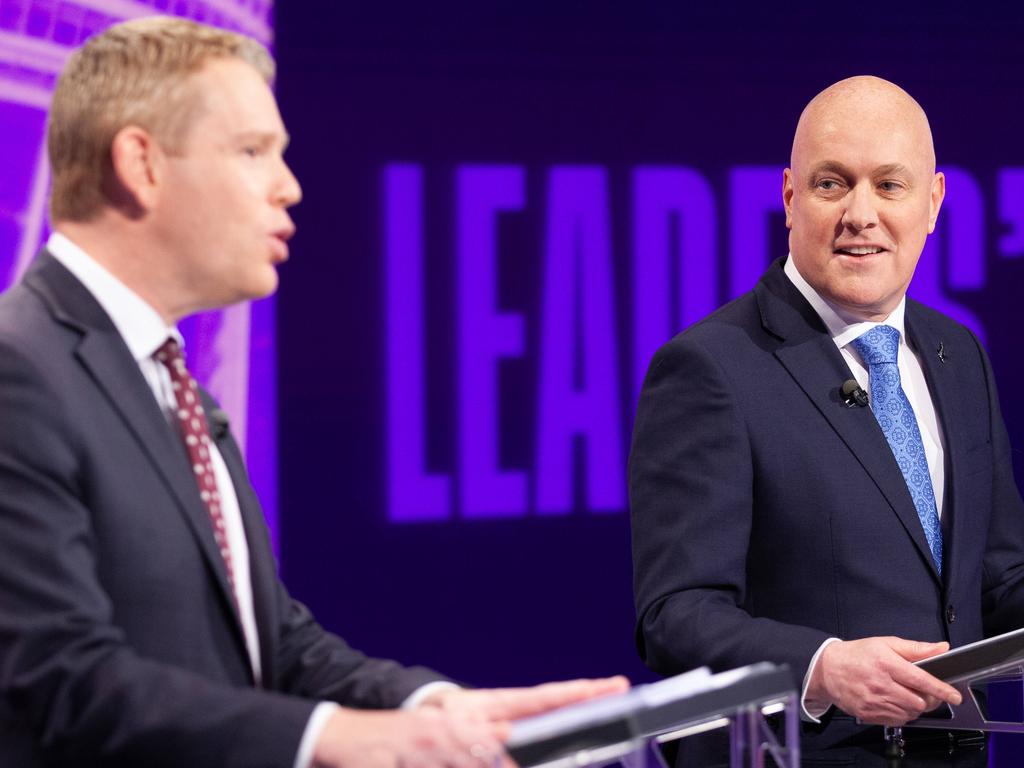



To join the conversation, please log in. Don't have an account? Register
Join the conversation, you are commenting as Logout